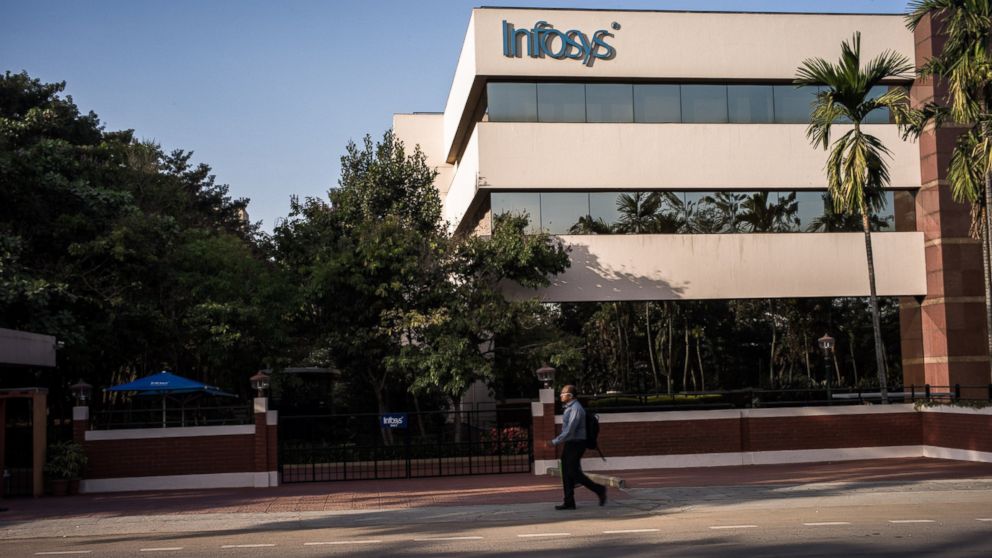Record Visa 'Fraud' Fine as Tech Firms Under Fire for Relying on Foreign Workers
Which firm is the biggest recipient of visas for skilled foreign workers?

Nov. 4, 2013 — -- intro: Tech companies have lobbied aggressively for immigration reform to allow more skilled foreign workers to enter the U.S. to increase America's global competitiveness.
But the companies that request the most H1-B work visas for engineers are actually facilitating outsourcing, critics say, including a firm fined last week by the Department of Justice for alleged "systemic" visa fraud.
Infosys, an Indian consulting and outsourcing company with a location in Plano, Texas, announced a $34 million civil settlement with the Justice Department on Wednesday. Of all companies in the U.S., Infosys received the fourth most H1-B visas between 2010 and 2012 -- a total of 6,550.
"I think Americans would be shocked by that, at least I hope," said Ron Hira, public policy professor at the Rochester Institute of Technology. "It's government policy that is actually trying to speed up the offshoring of jobs."
But the effects of immigration on U.S. jobs is more complicated than the one-for-one displacement of work, economists contend.
First introduced under the Immigration and Nationality Act of 1952, the H-1B visa program is a temporary work visa for non-immigrant workers in specialty occupations and requires a higher educational degree. Foreign-born workers under the program can typically be employed for three years by a sponsor company and apply to stay longer.
The use of the program became highly politicized this summer as the Senate debated comprehensive immigration reform. Tech gurus including Microsoft founder Bill Gates have asked Congress for more H1-B visas, or even an unlimited number of them, rather than the quotas in place today.
Infosys has denied all of the Justice Department's allegations, including that it unlawfully used H-1B visa holders to fill skilled labor jobs that the Justice Department says would "otherwise be performed by U.S. citizens or require legitimate H-1B visa holders." The terms of the settlement with the Justice Department were such that the company did not have to admit to any wrongdoing.
Read More: Infosys to Settle US Visa Fraud Case for $34 Million
Infosys says the company's use of B-1 visas was for "legitimate" business purposes and not in any way intended to circumvent the requirements of the H-1B program. It further contends that only 0.02 percent of the days that Infosys employees worked on U.S. projects in 2012 were performed by B-1 visa holders.
The effects of the H-1B visa program on wages is of particular interest to both economists and American unions. The Public Policy Institute of California, which has received funding from the tech industry, published a paper in December 2011 that shows H1-B visa holders are paid more than native workers and are more educated.
Hira, who previously conducted studies funded by the pro-union Economic Policy Institute, studied a smaller sample of H1-B workers and companies from 2010 to 2012 and found companies like Infosys typically paid foreign engineers only the minimum threshold that permits companies to bypass certain requirements under immigration law.
If more than 15 percent of a company's workforce uses H1-B visas, or is H1-B dependent, it must make a good-faith effort to recruit workers and it cannot displace workers. The minimum salary threshold for that is $60,000. Meanwhile Hira said these jobs typically can demand $80,000.
Giovanni Peri, an economist with the University of California, Davis, suggests that a solution to prevent firms from abusing the H1-B program would be to allow foreign workers more flexibility, such as allowing them to sponsor themselves and not be sponsored by a single firm. Peri's past work, funded by Microsoft, studied the economic impact of highly skilled immigrants in the U.S.
Hira said there are firms that use the H-1B visa program for "the best and brightest," and he does not recommend lawmakers stop the program.
"Mend it, don't end it. It's an important program to continue to have," said Hira, who will present his research on companies requesting H1-B visas at a conference for the Association for Public Policy Analysis and Management on Nov. 8.
Here is a list of 10 companies that received the most H1-B visas between 2010 and 2012, all of which except Microsoft have "significant offshoring" operations, according to Hira.
quicklist:1title: Cognizant category: US headquarters in Teaneck, N.J., and global headquarters in Chennai, Indiatext: H1-B Visas Received: 17,964
quicklist:2title: Tata Consultancy category: Headquarters: Mumbai, Indiatext: H1-B Visas Received: 9,083
quicklist:3title: Wiprocategory: Headquarters: Bangalore, Indiatext: H1-B Visas Received: 8,726
quicklist:4title: Infosyscategory: Headquarters: Bangalore, Indiatext: H1-B Visas Received: 6,550
quicklist:5title: Accenturecategory: Headquarters: Duplin, Irelandtext: H1-B Visas Received: 5,799
quicklist:6title: Microsoftcategory: Headquarters: Redmond, Wash. text: H1-B Visas Received: 4,766
quicklist:7title: IBMcategory: Headquarters: Armonk, N.Y. text: H1-B Visas Received: 3,770
quicklist:8title: Larsen & Toubrocategory: Headquarters: Mumbai, Indiatext: H1-B Visas Received: 3,286
quicklist:9title: HCLcategory: Headquarters: Noida, India text: H1-B Visas Received: 3,074
quicklist:10title: Deloittecategory: Headquarters: New York City text: H1-B Visas Received: 2,850




